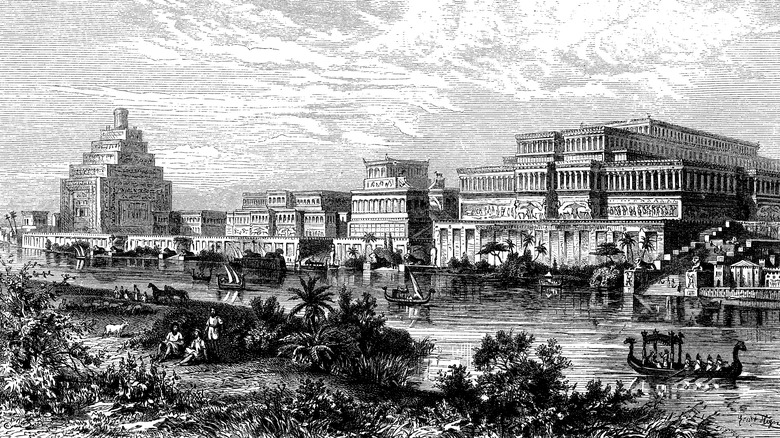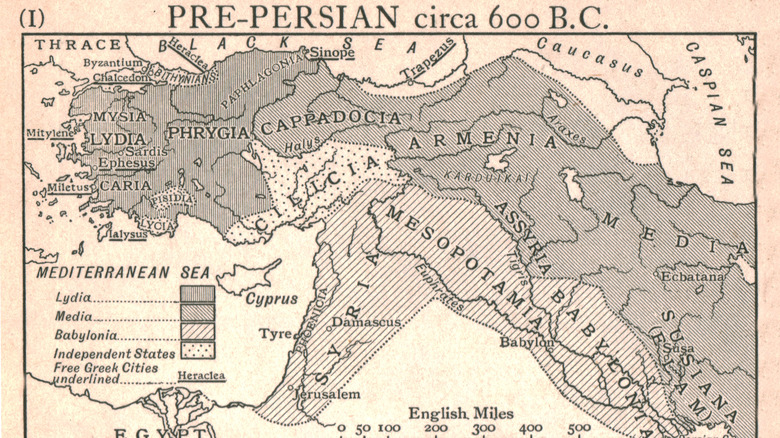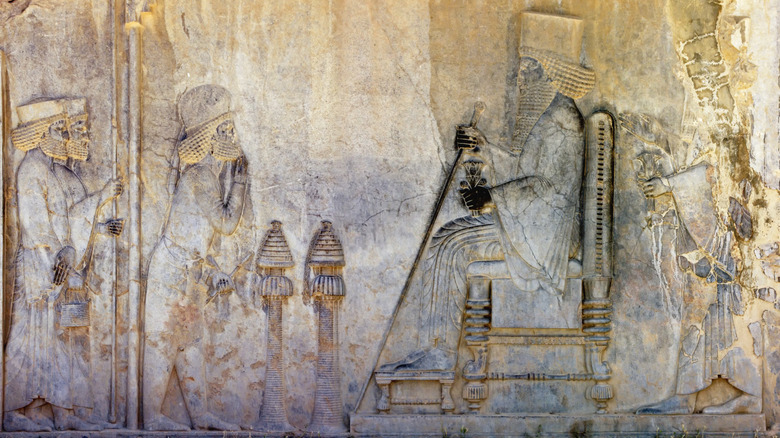This Is The Oldest Kingdom In The World
Lands and people ruled by kings and queens seem built into human civilization, but it all had to start somewhere. Prior to that, it's hard to know what leadership looked like amongst our ancestors largely because there wasn't written language. That all changed during the so-called "cradle of civilization," in Mesopotamia, a territory that covered parts of modern-day Iraq, Kuwait, Syria, and Turkey. Greek for "between two rivers," Mesopotamia developed between the Tigris and Euphrates rivers and was dubbed the "Fertile Crescent" by a 20th-century Egyptologist.
Civilization evolved in the region over thousands of years. As long ago as 10000 B.C., early agriculture took root. Over the next few thousand years, pottery was created and cured in ovens and the ancient city of Nineveh was settled. Between 6000 and 1750 B.C., the Sumerian civilization thrived and various cities were established. Within those cities and villages, Mesopotamians invented many things we still use today, and about 4,000 years ago, the first kings started popping up, some with more influence than others.
Mesopotamia introduced math, law, beer, and kings
What we consider civilization today was marked by a change of lifestyle among Mesopotamia's inhabitants. Specifically, they went from being nomadic to forming permanent settlements, which turned into villages and cities. People in the settlements grew crops, raised animals, and became proficient in particular jobs. They invented the wheel, brewed beer and wine, and wrote laws and codes. In fact, one of the biggest reasons we know about this time period is because Mesopotamians were among the first people to develop writing systems and recordkeeping. Mathematicians and astronomers emerged, and the intellectuals of the era developed the system of time we still keep, breaking it up into increments of seconds, minutes, and hours. But all of that didn't make it a kingdom.
Actually, there were lots of different cultures and no real central city, and while Islam is the dominant religion in the region today, ancient Mesopotamians were polytheistic. Yet they were also very dedicated to their many human-like gods and worked to meet their needs and keep them happy, which Brittanica says was their life's priority back then. Amidst the intellectual, architectural, and agricultural progress, the Early Dynastic Period started in 2700 B.C. With it came several early kings that ruled over individual cities, but the one credited for uniting the entire region and establishing the world's first empire was Sargon of Akkad, who reigned from 2334 to 2279 B.C.
Sargon of Akkad's kingdom helped shape the course of humanity
Sargon of Akkad conquered the territories and kings of the various city-states in Mesopotamia and ushered in things like the first postal system, enhanced irrigation systems, roads, and advances in science and the arts. He also shifted the perspective of how people lived. As Paul Kriwaczek, Mesopotamian scholar and author of "Babylon: Mesopotamia and the Birth of Civilization," explained: "Each city was the creation and home of a particular god. It is as if 'real life' was the one lived by the gods in the divine realm while what went on down here on earth was a largely irrelevant sideshow. The age of Sargon and Naram-Sin [Sargon's grandson] altered all that, switched the focus to the human world, and introduced a new conception of the meaning of the universe: one that made people rather than gods the principal subjects of the Mesopotamian story"
That shift in mindset was as important to shaping modern civilization as were the many discoveries and laws created in the ancient Mesopotamian era. In subsequent dynasties around the world, kings and pharaohs were revered as god-like in their kingdoms. But much of how life continued to play out in civilized societies was greatly influenced by its oldest kingdom.


